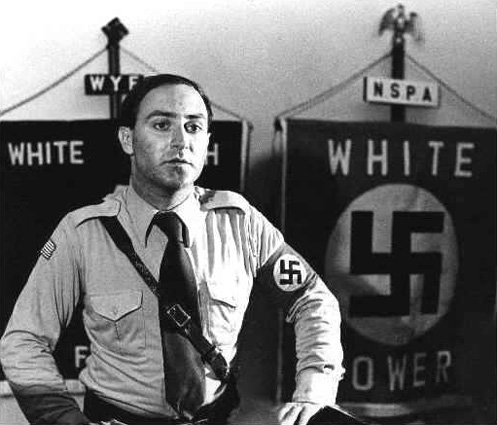|
Cox v New Hampshire considered the constitutionality of a Manchester, N. H. ordinance that set a fee from a nominal amount up to $300 for marches and parades. The ordinance was challenged by a band of Jehovah's Witnesses who, without seeking the required permit, conducted a march in which they held signs saying "Religion is a snare and a racket" and handed out leaflets to passers-by. The Supreme Court upheld both the permit requirement and the fee. The Court saw the permit requirement as allowing the city an opportunity to provide proper policy and held that the variable fee was permitted by the First Amendment. Chief Justice Hughes, writing for the Court, said "We perceive no constitutional ground for denying to local governments that flexibility of adjustment of fees which, in the light of varying conditions, would tend to conserve, rather than impair, the liberty sought." In Collin v Smith, the Seventh Circuit considered an ordinance of the predominantly Jewish suburb of Chicago, Skokie, that had clearly been enacted in an effort to thwart a proposed march through the city by a neo-Nazi group. The Nationalist Movement proposed a half hour march by about 30 members wearing uniforms that included swastikas and banners urging "Free Speech for White America." In response the the request for a parade permit, Skokie adopted a new ordinance prohibiting permits for demonstrations designed to incite hatred or violence against groups of persons because of race or religion and which also required groups seeking march or parade permits (unless the parade is sponsored by the city, as had been the case in Skokie with Memorial Day and Fourth of July parades) to obtain $300,000 liability insurance and $50,000 in property insurance. The Seventh Circuit panel, over a dissent, found the Skokie ordinance, both in terms of its content requirement and the insurance requirement, to violate the First Amendment. The court saw the insurance requirement as part of an effort to suppress the speech of the neo-Nazis. Finally, in Forsyth County v Nationalist Movement, the Supreme Court considered the ordinance of a Georgia county that required demonstrators and parade sponsors to obtain a permit and "pay in advance for such permit a sum not more that $1000." When the Nationalist Movement proposed to demonstrate in opposition to a federal holiday commemorating the birthday of Martin Luther King, Jr., the county imposed a $100 fee. The Nationalist Movement challenged the fee, arguing that imposing it in this case violated its First Amendment rights. By a 5 to 4 vote, the Court agreed. Writing for the majority, Justice Blackmun found the ordinance fatally flawed because it gave too much discretion to county officials to use the fee requirement to discourage unpopular speech. The dissenters argued that the decision in the case should have been controlled by Cox v New Hampshire. Walker v Birmingham raised a different issue. Walker raised the issue of whether civil rights demonstrators in Birmingham in 1963 had a constitutional right to march in defiance of a state court's injunction. By a bare majority, the Court upheld contempt convictions against the civil rights demonstrators, concluding that they had an obligation to appeal the court's order before marching--even if the permit ordinance they were ordered to comply with violated the First Amendment (the Court later, in Shuttlesworth v Birmingham (1969), struck down the Birmingham ordinance) and they had no realistic chance of obtaining a permit. The Court said only when an ordinance is "transparently invalid" (not merely invalid) can one raise the invalidity of the ordinance as a defense in a contempt case. The four dissenters complained that the Court's decision "magically transforms the command of an unconstitutional statute into an unpregnable barrier." |
Cases Cox v New Hampshire (1941) Collin v Smith (1978) Forsyth County v Nationalist Movement (1992)  Frank Collin, Nationalist Movement leader who sought permit to march in Skokie, Illinois Questions 1. Where does the law stand today
for permit fees for parades, marches, and other demonstrations?
Is a flat fee that is reasonably calculated to recover the actual costs
of provided security for the event permissible, even though this will
mean higher costs for more controversial speech?
2. Alternatively, are fees only permissible if they are the same for all permit seekers? 3. Could a fee vary based on the expected number of marchers or demonstrators? 4. How much discretion is too much discretion when it comes to permits?
|
